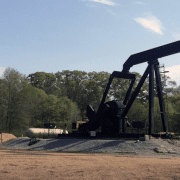⚠️ IMPORTANT LEGAL DISCLAIMER:
The information provided on this page is for general informational purposes only and does not constitute legal, financial, or investment advice. Oil and gas laws, mineral rights regulations, and royalty structures vary significantly by state and jurisdiction. While we strive to provide accurate and up-to-date information, no guarantee is made to that effect, and laws may have changed since publication.
You should consult with a licensed attorney specializing in oil and gas law in your jurisdiction, a qualified financial advisor, or other appropriate professionals before making any decisions based on this material. Neither the author nor the publisher assumes any liability for actions taken in reliance upon the information contained herein.
Inflation is a fundamental economic factor that affects nearly every aspect of personal finance and investment. For mineral rights owners and investors in oil and gas royalties, inflation introduces a unique set of challenges and opportunities. Understanding how inflation influences the value, purchasing power, and financial management of royalty income is crucial for maximizing returns and preserving long-term wealth.
This article explores the relationship between inflation and oil and gas royalties, examining the mechanisms through which inflation exerts its effects, and offering practical strategies for navigating inflationary periods with confidence.
Understanding Oil and Gas Royalties
Oil and gas royalties represent a passive income stream earned by individuals or entities that own mineral rights. When these rights are leased to energy companies, the owners receive a percentage of the revenue generated from the production of oil, gas, or other minerals. The terms of the lease agreement determine the royalty rate, payment structure, and duration of income.
Royalties are typically based on either gross or net production revenues. Gross revenue royalties are calculated from total sales before expenses, while net revenue royalties account for post-production costs. This distinction becomes especially important during inflationary periods when operational expenses tend to rise.
The Nature of Inflation and Its Economic Effects
Inflation refers to the general increase in prices of goods and services over time. It erodes purchasing power, meaning that a fixed amount of money buys fewer goods and services as time progresses. Inflation is influenced by a variety of factors, including monetary policy, supply chain disruptions, labor market dynamics, and geopolitical events.
For royalty owners, inflation is not just a macroeconomic concept—it has real-world implications on income, expenses, and investment strategies. The effects of inflation can manifest in both positive and negative ways, depending on market conditions, royalty structures, and individual financial goals.
Inflation’s Impact on Royalty Income
One of the most direct effects of inflation is its influence on commodity prices. Historically, inflationary periods have often coincided with rising oil and gas prices. As energy becomes more expensive, the revenues generated from production also tend to increase. This can lead to higher royalty payments for mineral rights owners.
However, this relationship is not always straightforward. Inflation can also increase production and transportation costs for energy companies. If royalty agreements are based on net revenues, these rising costs can reduce the amount distributed to royalty owners. In such cases, even if gross revenues increase, the net payments may remain flat or even decline.
Royalty income that is structured as a fixed percentage of gross revenue may offer better insulation against inflationary pressures, as it is less affected by rising operating expenses. Understanding the specific terms of royalty agreements is crucial for evaluating how well-positioned a royalty interest is during inflation.
Purchasing Power and Cost of Living Adjustments
While royalty income may rise in nominal terms during inflation, the real value of that income—what it can actually buy—may still decline. Retirees and other individuals who rely on royalties for everyday expenses must consider how inflation diminishes purchasing power over time.
In contrast to Social Security or pension benefits that may include cost of living adjustments, royalty income does not automatically adjust for inflation. This means that a fixed monthly royalty check buys fewer goods and services each year if inflation is unchecked. As a result, planning for long-term inflation protection is critical.
Investors and landowners should evaluate how their royalty income aligns with current and projected living expenses. Supplementing royalty income with investments that historically perform well during inflation, such as commodities or inflation-protected securities, can help maintain purchasing power.
Asset Valuation and Inflationary Trends
The value of oil and gas royalty interests is influenced by expectations about future income streams. During inflationary periods, if oil and gas prices are rising, the market value of royalty interests may also increase. This can make royalty assets more attractive to buyers and investors, potentially raising demand and market prices.
However, inflation-driven volatility can also create uncertainty. If inflation leads to rapid changes in energy prices or production costs, it may affect investor confidence and valuation models. The discount rate used to calculate the present value of future royalty income may rise with inflation, potentially offsetting some of the gains from higher nominal income.
Royalty owners considering a sale should monitor market trends and consult valuation experts to determine whether it is an opportune time to sell. Timing asset sales during favorable market conditions can enhance returns and support broader financial goals.
Taxation and Inflation-Adjusted Strategies | How Inflation Impacts Oil and Gas Royalties
Inflation can also affect the tax burden associated with oil and gas royalties. Royalty income is taxed as ordinary income and may be subject to self-employment taxes depending on ownership structure. During periods of rising income due to inflation, royalty owners may find themselves in higher tax brackets.
At the same time, inflation can erode the real value of after-tax income. Retirees and investors must account for both nominal tax rates and real purchasing power when planning withdrawals and distributions. Leveraging deductions, such as the depletion allowance, can help mitigate tax liability.
Incorporating tax-efficient strategies, such as income deferral, charitable contributions, and use of tax-advantaged accounts, can be particularly beneficial during inflationary cycles. Working with a tax advisor familiar with oil and gas income is essential for optimizing financial outcomes.
Investment Diversification as an Inflation Hedge
While oil and gas royalties can offer a strong hedge against inflation due to their correlation with commodity prices, overreliance on a single asset class can increase financial vulnerability. Diversifying investments beyond energy royalties can help retirees and investors balance risk and maintain income stability.
Assets that historically perform well during inflation include real estate, precious metals, infrastructure funds, and inflation-protected bonds. By spreading investments across different asset types and sectors, royalty owners can reduce the impact of inflation on their overall financial portfolio.
Diversification also involves considering geographic exposure and the performance of different energy basins. Royalty interests in high-performing or low-cost production regions may fare better during inflation, making it worthwhile to assess the quality and location of assets.
Estate Planning and Long-Term Implications
Inflation can affect estate planning decisions, particularly for individuals looking to transfer oil and gas royalties to future generations. The long-term value and income potential of royalties may be influenced by inflationary trends, impacting inheritance strategies.
Structuring ownership through trusts, family limited partnerships, or LLCs can provide greater flexibility and tax advantages. These structures can also help mitigate estate tax exposure and facilitate smooth asset transfers. Regularly updating estate plans to reflect current market conditions and inflation forecasts is essential.
Heirs and beneficiaries should be educated about the nature of royalty assets and how inflation might affect future income. Providing clear documentation, financial guidance, and legal support can ensure that future generations are equipped to manage inherited royalties effectively.
Evaluating Lease Terms and Renegotiation Opportunities | How Inflation Impacts Oil and Gas Royalties
Inflation can present an opportunity to revisit existing lease agreements. If leases were signed during periods of lower commodity prices or economic stability, their terms may no longer reflect current market conditions. Retirees and landowners may consider renegotiating lease terms to secure better royalty rates or bonus payments.
Reviewing lease agreements with legal and financial professionals can identify clauses related to payment timing, deduction of post-production costs, and termination provisions. In some cases, landowners may choose to let leases expire and re-negotiate with new operators under more favorable terms.
Maintaining active oversight of lease performance and market developments can enhance income potential and ensure that royalty agreements remain competitive in an inflationary environment.
Mitigating Risk Through Professional Support
Navigating inflation’s impact on oil and gas royalties requires specialized knowledge and proactive management. Engaging with professionals such as mineral managers, financial advisors, and tax consultants can help royalty owners develop comprehensive strategies tailored to their unique financial situations.
Professional mineral managers can track production data, audit royalty payments, and provide detailed financial reporting. Financial advisors can assess how royalty income fits into an overall retirement plan and suggest appropriate diversification and risk management strategies.
Regular communication with this team ensures that royalty owners remain informed and agile in responding to inflation-related challenges. This collaborative approach supports better decision-making and long-term wealth preservation.
Understanding the Broader Energy Market Dynamics | How Inflation Impacts Oil and Gas Royalties
The impact of inflation on oil and gas royalties cannot be fully understood without considering broader energy market dynamics. Global supply and demand, geopolitical tensions, and technological advancements all influence the pricing and production of oil and gas.
Inflation may coincide with supply chain disruptions or political instability, which can drive energy prices higher. At the same time, shifts toward renewable energy and climate policy may introduce uncertainty in long-term fossil fuel demand. These macroeconomic and industry-specific factors interact with inflation in complex ways.
Staying informed about industry trends, regulatory developments, and global economic conditions is essential for anticipating how inflation may affect royalty income. Subscribing to energy market reports and engaging with industry associations can provide valuable insights.
Inflation is a powerful force that shapes the financial landscape for oil and gas royalty owners. While it can lead to increased income through higher energy prices, it also presents challenges related to purchasing power, taxation, and investment strategy. Understanding the multifaceted impact of inflation is essential for making informed financial decisions.
By proactively managing royalty income, diversifying investments, optimizing tax strategies, and working with experienced professionals, mineral rights owners can navigate inflationary periods with greater confidence. Ultimately, adapting to inflation with strategic planning ensures that oil and gas royalties continue to serve as a valuable and sustainable source of income.











